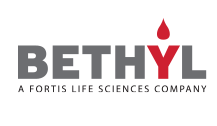Rabbit anti-SART3/TIP110 IHC Antibody Affinity Purified

Product Details
Specifications
The epitope recognized by IHC-00294 maps to a region between residue 600 and 650 of human squamous cell carcinoma antigen recognized by T-cells 3 (Tat-interacting protein of 110 kDa) using the numbering given in entry NP_055521.1 (GeneID 9733).
Immunoglobulin concentration was determined using Beer’s Law where 1mg/mL IgG has an A280 of 1.4. Antibody was affinity purified using an epitope specific to SART3/TIP110 immobilized on solid support.
The epitope recognized by IHC-00294-T maps to a region between residue 600 and 650 of human squamous cell carcinoma antigen recognized by T-cells 3 (Tat-interacting protein of 110 kDa) using the numbering given in entry NP_055521.1 (GeneID 9733).
Immunoglobulin concentration was determined using Beer’s Law where 1mg/mL IgG has an A280 of 1.4.
Additional Product Information
SART3 (squamous cell carcinoma antigen recognized by T cells 3) was identified as an antigenic peptide expressed in esophageal cancer cells that is recognized by cytotoxic T lymphocytes. Originally, in a search for a U6 small nuclear RNA capping enzyme, SART3 was identified as a 110kDa nuclear RNA-binding protein. Later, by database searching, SART 3 was determined to also be the human ortholog of the yeast Prp24 snRNP recycling factor that functions in the reassembly of the U4/U6 snRNP during the recycling phase of the splicesome cycle. Recently, SART3-derived peptides have been investigated as candidates for peptide-based immunotherapy in prostate cancer patients due to their ability to induce cytotoxic T lymphocyte activity against prostate cancer cells.
Alternate Names
DSAP1; HIV-1 Tat-interacting protein of 110kDa; hSART-3; P100; p110; p110 nuclear RNA-binding protein; p110(nrb); RP11-13G14; SART-3; squamous cell carcinoma antigen recognized by T cells 3; squamous cell carcinoma antigen recognized by T-cells 3; tat-interacting protein of 110 kDa; TIP110
Applications
Epitope exposure is recommended.
Epitope exposure with citrate buffer will enhance staining.
Likely to work with frozen sections.
In some cases, the antibody may be diluted further than indicated.
